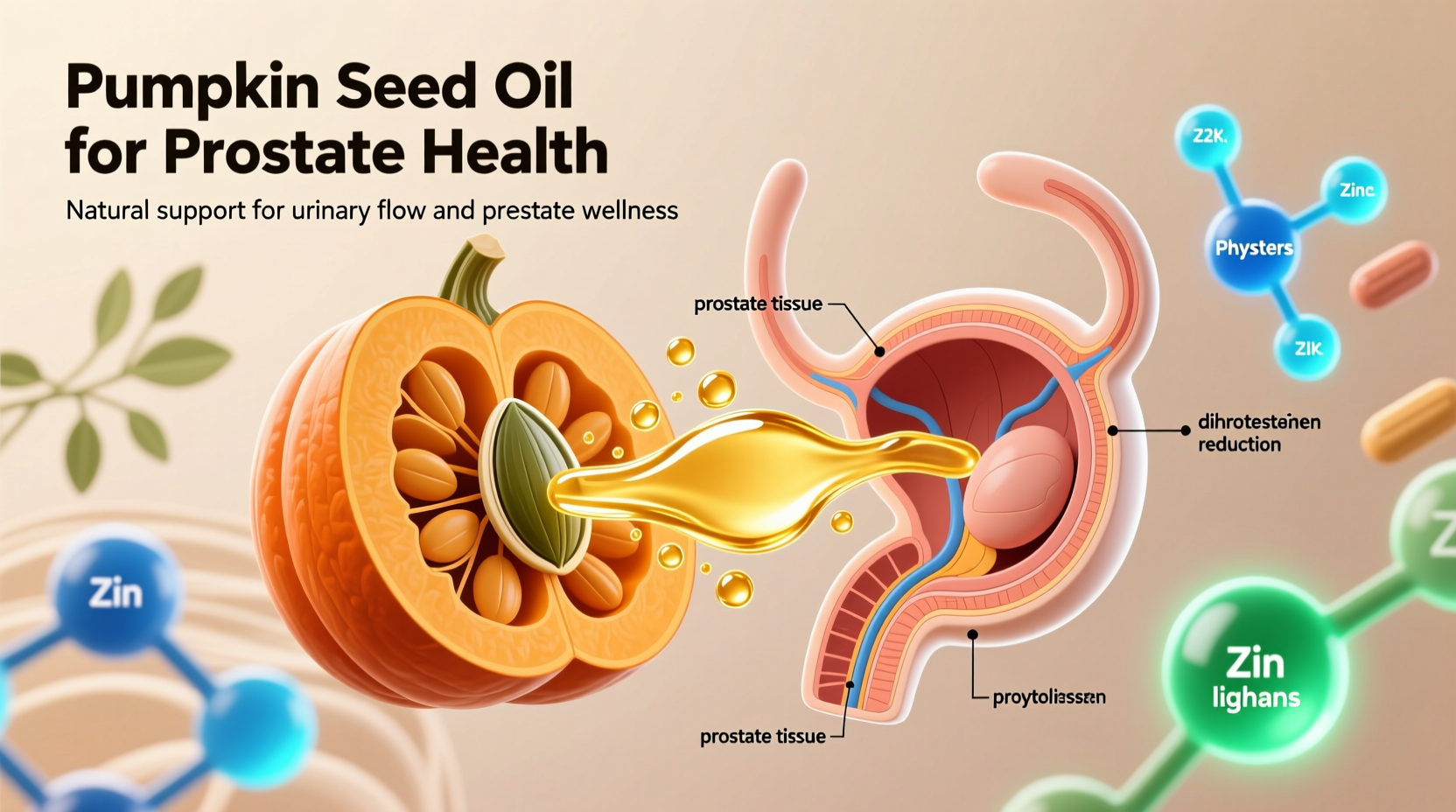Men exploring natural approaches for prostate wellness often encounter pumpkin seed oil as a potential remedy. Unlike quick-fix supplements, this traditional botanical requires understanding both its science-backed benefits and realistic limitations. Let's examine what rigorous research actually reveals about pumpkin seed oil for prostate health.
How Pumpkin Seed Oil Works for Prostate Support
Pumpkin seed oil contains high concentrations of phytosterols and antioxidants that may influence prostate health through two key mechanisms:
- 5-alpha-reductase inhibition: Compounds like delta-7-sterine may reduce conversion of testosterone to dihydrotestosterone (DHT), a hormone linked to prostate enlargement
- Anti-inflammatory action: Carotenoids and tocopherols help decrease inflammation in prostate tissue
Unlike pharmaceutical options that target single pathways, pumpkin seed oil's multi-component profile offers a gentler approach. However, this also means effects develop gradually—typically requiring 12-24 weeks of consistent use before symptom improvement becomes noticeable.
Clinical Evidence: What Studies Actually Show
Research reveals promising but nuanced results. A pivotal 2014 Urology journal study tracked 1,434 men with mild-moderate BPH over 12 months. Those taking 1,000 mg daily of standardized pumpkin seed oil extract showed:
| Measurement | Pumpkin Seed Oil Group | Placebo Group |
|---|---|---|
| IPSS Score Reduction* | 31% improvement | 14% improvement |
| Nighttime Urination | 2.1 fewer episodes | 0.8 fewer episodes |
| Quality of Life Score | 40% better | 18% better |
*International Prostate Symptom Score (IPSS) measures urinary symptom severity
This aligns with findings from the National Center for Complementary and Integrative Health, which notes pumpkin seed preparations demonstrate "modest but consistent" improvements in urinary parameters. Crucially, benefits appear most pronounced for men with International Prostate Symptom Scores between 8-19 (mild to moderate symptoms).
Practical Application Guidelines
For those considering pumpkin seed oil, these evidence-based parameters matter most:
Dosage and Form Selection
- Minimum effective dose: 1,000 mg daily of cold-pressed, unrefined oil (providing ≥80mg phytosterols)
- Optimal form: Standardized extracts (look for ≥40% phytosterol content) outperform raw oil in clinical trials
- Critical timing: Take with fatty meals to boost absorption of fat-soluble compounds
Realistic Expectations Timeline
Understanding the progression helps avoid premature discontinuation:
- Weeks 1-4: No noticeable changes (oil integrates into cellular systems)
- Weeks 5-12: Gradual reduction in nighttime bathroom trips
- Months 3-6: Peak symptom improvement for responsive individuals

Important Context Boundaries
This remedy isn't universally effective. Research from the American Urological Association clarifies key limitations:
- Not for severe cases: Men with IPSS scores >20 or prostate volumes >60mL show minimal response
- No cancer prevention: Zero evidence it reduces prostate cancer risk (per NIH studies)
- Medication interactions: May enhance blood-thinning effects of warfarin (monitor INR levels)
- Temporary solution: Symptoms typically return within 8-12 weeks after stopping
Integrating With Proven Approaches
For best results, combine pumpkin seed oil with these evidence-backed strategies:
- Dietary synergy: Pair with lycopene-rich foods (tomatoes, watermelon) shown to support prostate tissue
- Timed fluid management: Restrict evening fluids 3 hours before bed to maximize nighttime relief
- Medical monitoring: Continue regular PSA tests and urological exams—never substitute for professional care
When to Consult Your Doctor Immediately
Discontinue use and seek medical evaluation if you experience:
- Inability to urinate (acute urinary retention)
- Blood in urine lasting over 48 hours
- Sudden symptom worsening after initial improvement
Prostate symptoms can indicate serious conditions requiring prompt treatment. The European Association of Urology emphasizes that natural remedies like pumpkin seed oil serve only as complementary options alongside conventional care—not replacements.
Frequently Asked Questions
Does pumpkin seed oil shrink the prostate?
No clinical evidence shows pumpkin seed oil reduces prostate size. Research indicates it primarily improves urinary flow and symptom severity through anti-inflammatory effects, not actual tissue reduction. Prostate volume measurements in studies remained unchanged despite symptom improvement.
How long before noticing effects from pumpkin seed oil?
Most men report initial symptom changes after 8-12 weeks of consistent 1,000-2,000 mg daily dosing. Maximum benefits typically appear between 3-6 months. A 2020 meta-analysis in Phytotherapy Research found only 22% of participants noticed improvements before week 10.
Can I take pumpkin seed oil with prescription BPH medication?
Generally yes, but consult your doctor first. Studies show synergistic effects when combined with alpha-blockers like tamsulosin, potentially allowing lower medication doses. However, monitor for increased dizziness as both can lower blood pressure. Never adjust prescription doses without medical supervision.
What's the best type of pumpkin seed oil for prostate health?
Choose cold-pressed, unrefined oil in dark glass bottles with ≥40% phytosterol content. Look for standardized extracts specifying Cucurbita pepo var. styriaca (Styrian pumpkin) origin, which contains higher delta-7-sterine concentrations. Avoid roasted or refined oils—processing degrades active compounds.











 浙公网安备
33010002000092号
浙公网安备
33010002000092号 浙B2-20120091-4
浙B2-20120091-4